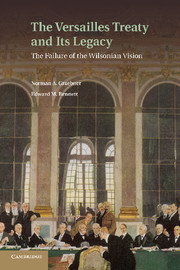Book contents
- Frontmatter
- Contents
- Preface
- 1 The International Order on Trial
- 2 The Road to Paris: 1917???1918
- 3 Versailles: A Study in Arrogance
- 4 The Retreat to Utopia
- 5 Manchuria and the Triumph of Non-Recognition
- 6 The Rise of Hitler
- 7 Challenge of the Dictators
- 8 The Elusive Response
- 9 Munich: The Continuing Escape from Reality
- 10 The Road to Prague
- 11 The Soviet Quest for Collective Security
- 12 The Coming of War: 1939
- Bibliography
- Index
- References
11 - The Soviet Quest for Collective Security
Published online by Cambridge University Press: 07 October 2011
- Frontmatter
- Contents
- Preface
- 1 The International Order on Trial
- 2 The Road to Paris: 1917???1918
- 3 Versailles: A Study in Arrogance
- 4 The Retreat to Utopia
- 5 Manchuria and the Triumph of Non-Recognition
- 6 The Rise of Hitler
- 7 Challenge of the Dictators
- 8 The Elusive Response
- 9 Munich: The Continuing Escape from Reality
- 10 The Road to Prague
- 11 The Soviet Quest for Collective Security
- 12 The Coming of War: 1939
- Bibliography
- Index
- References
Summary
I
Germany and the Soviet Union entered the post-Versailles world as pariah states. Both had been denied roles in the Paris decisions of 1919; both had been ostracized thereafter from the main currents of European economic and diplomatic affairs. Their partial reentry came with invitations to the Genoa Economic Conference of April–May 1922. The agenda demanded their presence. The conference quickly broke down over Russia’s refusal to honor its pre-war debt to France. France, joined by Britain, rejected any further efforts at accommodation with the USSR. In response, Georgii Chicherin, the Soviet Commissar of Foreign Affairs, with the acquiescence of Deputy Commissar Maxim Litvinov, turned to Germany for support. The result was the Rapallo Treaty of April 16, 1922, in which both countries renounced reparations.
Rapallo was ostensibly a trade pact between Russia and Germany, but actually constituted an arrangement for military cooperation whereby the German army would avoid the Versailles restrictions by training in the Soviet Union. Meanwhile, the Red Army would benefit from the military expertise of the German high command. Rapollo, however, was never a bond of friendship. For Joseph Stalin, friendship among nations was an impossibility. The only principle that guided the conduct of the USSR was self-interest.
- Type
- Chapter
- Information
- The Versailles Treaty and its LegacyThe Failure of the Wilsonian Vision, pp. 206 - 225Publisher: Cambridge University PressPrint publication year: 2011

